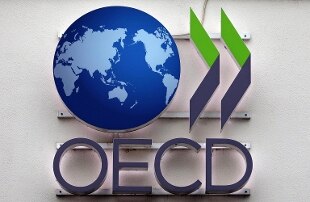Lagarde: 2020 eurozone GDP revised for the better at -8%.
Economic activity rebounds in the third quarter
Jobs, nearly half a million jobs went up in smoke in three months
Bank of Italy: new record public debt of 2,560.5 billion
Recovery Fund, Gualtieri: "Turning point, unrepeatable opportunity"
Share
September 16, 2020 Italy's GDP will decrease by 10.5% in 2020 before returning to positive growth, to 5.4% in 2021: this is what emerges from the intermediate economic prospects of the OECD released today in Paris.
Eurozone GDP -7.9% in 2020, + 5.1% in 2021
Eurozone GDP will decrease by -7.9% in 2020 before returning to growth, to 5.1%, in 2021: this is what emerges from the Intermediate economic perspectives of the OECD released today in Paris.
Also according to the interim estimates of the international body, Germany will score -5.4% in 2020 and + 4.6% in 2021. As for France, a -9.5% is expected in 2020 and +5.8 % in 2021.
World GDP in 2020, growth in 2021
World GDP will decrease by 4.5% in 2020, before increasing by 5% in 2021: this is what emerges from the intermediate economic prospects of the OECD announced today in Paris.
According to the body for economic cooperation and development, a "gradual recovery" is currently underway after an "unprecedented shock".
"The economic prospects - specifies the body - remain exceptionally uncertain, with the COVID-19 pandemic continuing to weigh heavily on economies and society", a signal from the OECD.
"Global production in the second quarter of 2020 was more than 10% lower than at the end of 2019, a sudden shock unprecedented in modern times", continues the OECD in the Interim Economic Outlook, adding: "The magnitude and the timing of the pandemic shock varied across major economies, but all suffered a sharp contraction in activity as necessary containment measures were implemented. Global trade plummeted, declining by more than 15% in the first half of 2020, and labor markets have been severely disrupted by the reduction in working hours, the loss of jobs and the forced closure of businesses. Furthermore, for the OECD, "without the prompt and effective political support introduced in all economies to cushion the impact of the shock on household incomes and businesses, the contraction in output and employment would be substantially wider. "
policy actions have EVIT
a greater collapse
"The vast political actions undertaken with the development of the pandemic have helped prevent an even greater collapse and buffer the incomes of families and businesses," says the OECD in the Intermediate Economic Outlook released today in Paris.
"With the recovery that remains hesitant, sporadic outbreaks of the virus still underway, and many sectors still struggling to adapt - warns the body - support for fiscal and monetary policies must be maintained to preserve confidence and limit uncertainty".
Worst crisis since 2 / a world war
"The world is suffering the most dramatic economic slowdown since the Second World War": this is the message launched by the chief economist of the OECD, Laurence Boone, presenting the intermediate economic prospects of the OECD in Paris .
Boone has once again insisted on the exceptional level of uncertainty weighing on global economies today due to the coronavirus.

